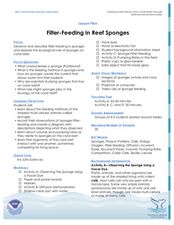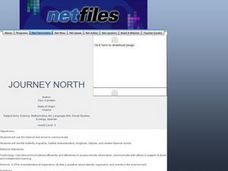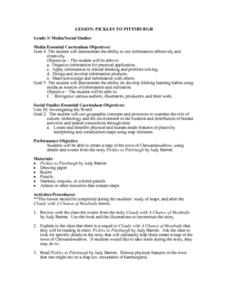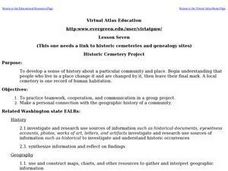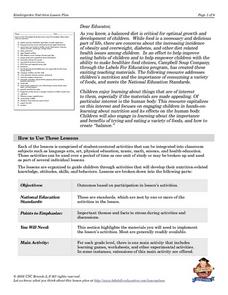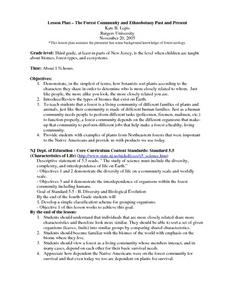Curated OER
Filter Feeding in Reef Sponges
Students investigate the role of sponges in our oceans. In this biology lesson, students create a diagram visualizing how sponges bring food into their bodies through a filtering process. Students discuss the connections...
Curated OER
Macroinvertebrate Simon Says
Students study the four groups of macroinvertebrates. In groups, they explore the characteristics of macroinvertebrates. Through playing a "Macroinvertebrate Simon Says" game, students discover the adaptations of the animals and their...
Curated OER
Light Microscopes
Seventh graders study the parts of a light microscope, and its proper use. They identify each part and explain why it is important to know how to use this tool. They practice observing newsprint on a wet mount slide.
Curated OER
Journey North
Third graders study butterflies and their migration habits. They track butterfly migration and communicate via e-mail with students in Mexico where the butterflies migrate. They write letters to the students in Mexico, as well.
Curated OER
Where to shop?
Students study a topic of an environmental nature that is relevant to them (as individuals) on a local level, but with global implications. They consider whether their family's shopping habits have any lasting effects on the environment.
Curated OER
Introduction to the Barnegat Bay Estuary
Young scholars research estuaries. For this estuaries lesson, students discuss the differences in a bay and an ocean. Young scholars watch a PowerPoint of the properties of the estuaries and geography of Barnegat Bay. Students complete a...
Curated OER
Exploring the Maryland State Archives Website
Student demonstrates the ability to organize, manage and comprehend information and applies appropriate skills to collect organize, and interpret data, They then explore an appreciation of media a sources of information and recreation.
Curated OER
"Julie of the Wolves"
Fifth graders research life in Alaska and compare life there to their lives in this lesson. They read "Julie of the Wolves." They research through the novel and other reference books facts about the Alaskan climate and geography. They...
Curated OER
Dinosaurs 1: Where Are the Dinosaurs?
Students explore dinosaurs. In this dinosaur identification instructional activity, students watch video clips for different dinosaurs from the Discovery Kids website. Students discuss the clips with their teacher. Students may then role...
Curated OER
Magnetic Bookmarks
Students design magnetic bookmarks with healthy living messages. They decide on the shape, length, color, and type of material to use for creating their bookmark. Students write in an "inventor's journal" about their design and...
Curated OER
Pickles to Pittsburgh
Third graders explore the geography in the book "Pickles to Pittsburgh" by Judy Barrett. They read the story and identify the physical features of the town, discuss the elements included on a map, and create a map of the town of...
Curated OER
Making Good Decisions
Students read an article. In this problem solving lesson, students read an article where they must solve the problem presented. Students work in groups to discuss the issue and come up with a way to solve the problem.
Curated OER
Health: Symptoms and Stages of Pregnancy
Students examine the growth and changes that occur during the three trimesters of pregnancy. Issues such as toxemia and spontaneous abortion are also considered. In groups, students rotate to various stations exploring aspects related...
Curated OER
Explore the Food Web
Learners identify plants and animals in the journals of Lewis and Clark's expedition. They describe the various animal habits. Students interpret the behaviors of the animals discovered on the expedition. They design a food web using...
Dearborn Public Schools
Parent Informational Meeting
What factors should parents and guardians consider when helping their children select high school courses each year? A presentation designed for Parent Information Night outlines the requirements students must meet in order to graduate.
Curated OER
What's on the Outside/Inside?
Students read about the idea of gender perspective in the writing of German history. They generate definitions from a list of given vocabulary words. They write definintions using their own words.
Curated OER
Historic Cemetery Project
Students use the Virtual Atlas to examine the cemetaries in the state of Washington. In groups, they view photographs of local monuments to celebrate the lives of local members. They choose one to focus on and research. To end the...
Curated OER
Be Screen Free for a Week
Challenge yourself to completely close all of your electronic screens for seven straight days!
Curated OER
"Tomorrow and Tomorrow and Tomorrow"
Do you want to live forever? After reading Kurt Vonnegut’s short story, “Tomorrow and Tomorrow and Tomorrow,” class groups adopt the roles of an ethics committee, product manufacturers, concerned scientists, and potential users of an...
Curated OER
Nutrition Lesson Plan
Second graders complete a survey as class answering the question: "Did you eat breakfast this morning?". They place a tally mark in the column that best represents their answer. They then discuss the results in the graph.
Curated OER
Nutrition Lesson Plan
Third graders explore a variety of breakfast foods and beverages and write a creative story about their favorite. They then present their stories to the class and are encouraged to try different foods during the story time.
Curated OER
The ABC's of Breakfast
Students identify the food group of various culturally diverse breakfast foods and discuss the importance of eating a healthy, well-balanced breakfast every morning. They then try different foods that begin with the letter A, B and C and...
Curated OER
The Tongue Untied: A Guide to Grammar, Punctuation, and Style
Is/are? Who/that? Young grammarians must select the correct form of the verb to agree with the subject in a series of sentences. The resource can be used for as an in-class activity or as homework for extra practice.
Curated OER
The Forest Community And Ethnobotany Past And Present
Students describe a forest as a living community. They determine members interact, and in many cases, depend on each other for their basic survival needs. They investigate how dependent the Native Americans were on the forest...


